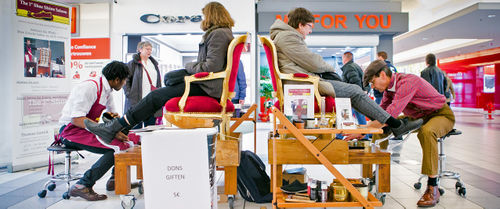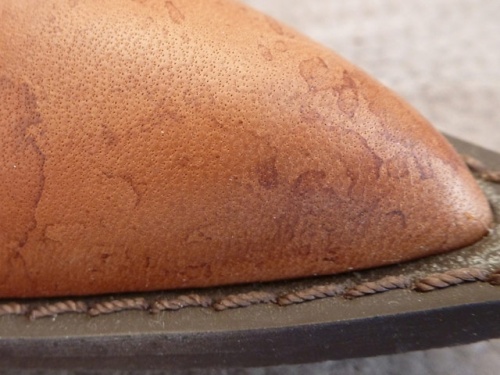Difference between revisions of "Shoe care"
| Line 31: | Line 31: | ||
In order to meet the trend, the manufacturers' attention to shoe polish is now focused on efficient and fast shoe cleaning. The ritual has become a necessary evil such as brushing teeth or shaving. The shoe has to be cleaned and made shiny with little effort. | In order to meet the trend, the manufacturers' attention to shoe polish is now focused on efficient and fast shoe cleaning. The ritual has become a necessary evil such as brushing teeth or shaving. The shoe has to be cleaned and made shiny with little effort. | ||
| + | |||
| + | ==Stains on shoe leather== | ||
[[Suede]] and [[nubuck]] should never be treated with shoe polish! They are [[Porous leather|porous leathers]] and oil or grease are absorbed deep into the leather, which can leave stains. An aerosol [[Waterproofing leather|water repellent]] is the best and safest protection. | [[Suede]] and [[nubuck]] should never be treated with shoe polish! They are [[Porous leather|porous leathers]] and oil or grease are absorbed deep into the leather, which can leave stains. An aerosol [[Waterproofing leather|water repellent]] is the best and safest protection. | ||
Latest revision as of 11:26, 8 June 2023
The best of the shoeshiners: www.essa.expert - European Shoe Shine Association.
Contents
Shoe care - Shoe polish
Shoe polish is the most classic leather care product for looking after smooth leather shoes. A shoe polish is used to waterproof the uppers of shoes and should generally produce a beautiful shiny gloss. It provides chemical and mechanical protection against environmental influences such as moisture, friction and dehydration.
Shoe care has a strong tradition, dating back to the times when dry feet were very important to health. Shoes also had a higher material value in the past and had to be preserved.
High-quality shoe care products. - Shoe polishers in Buenos Aires, Argentina.
Nowadays, shoe care is on the retreat. Young people rarely have a shoe cabinet where they regularly clean and polish their footwear. According to a survey in 2011, 70% of 14-19-year-olds polish their shoes "rarely" or "never". Of the 20 to 29-year-olds, it's 60% and the 60 to 65-year-olds 25%. 47% of the 60 to 65-year-olds clean their shoes at least once a week. For the 20 to 29-year-olds, it is only 18%. Shoes have become a fashion product and there is a wide range of inexpensive footwear, where long-term maintenance is no longer in proportion.
In order to meet the trend, the manufacturers' attention to shoe polish is now focused on efficient and fast shoe cleaning. The ritual has become a necessary evil such as brushing teeth or shaving. The shoe has to be cleaned and made shiny with little effort.
Stains on shoe leather
Suede and nubuck should never be treated with shoe polish! They are porous leathers and oil or grease are absorbed deep into the leather, which can leave stains. An aerosol water repellent is the best and safest protection.
Nubuck leather treated with smooth leather care. The result is stains, or a vintage look.
Attempting to remove a stain in the suede only made the stain worse.
Shoes with porous smooth leather are not for bad weather. The result is water marks. Even waterproofing can only provide partial protection. Such changes are part of the patina (used look) of such types of leather.
Open-pored shoe leather with stains from liquids.
Videos about how to clean shoes
Cleaning and care of greased leather shoes.
Additional information
- Sole oil
- Leather care
- Basic rules when dealing with leather
- Leather care instructions - Home remedies
- Ecological leather care - Eco leather care
- Gloss of leather
- Leather shoes
















 a kotori web solution
a kotori web solution